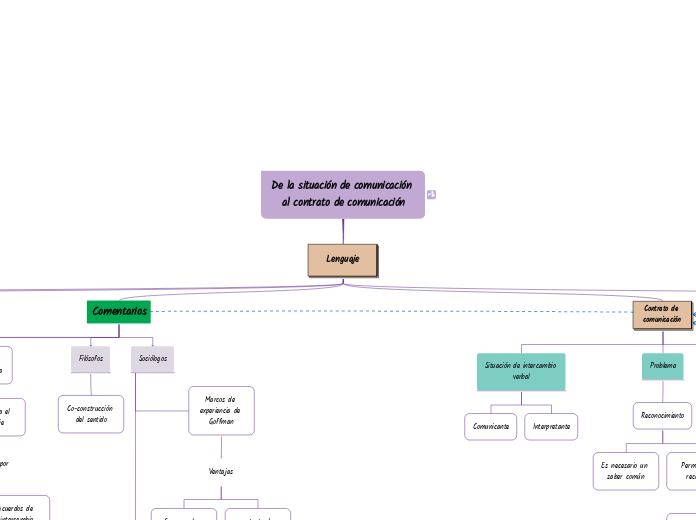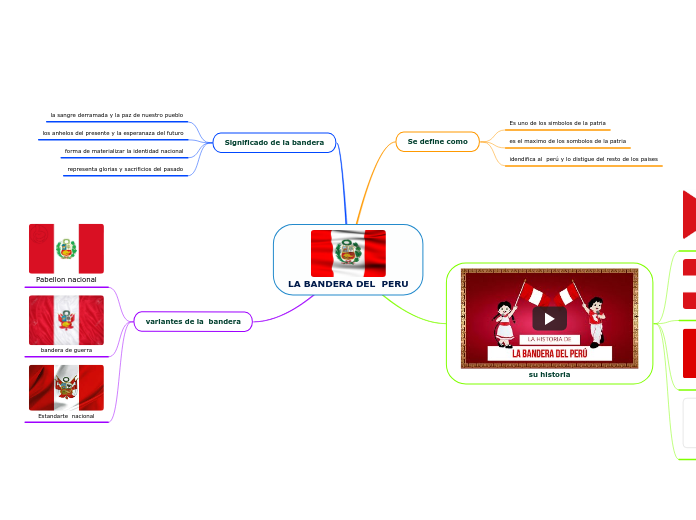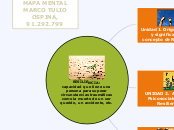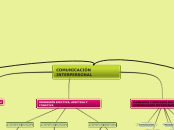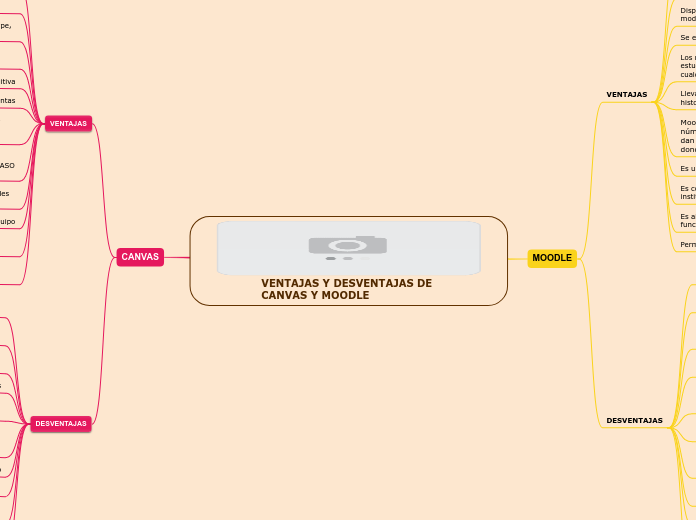De la situación de comunicación al contrato de comunicación
Type in the name of the multiple-perspectives text.
Example: Bridge to Terabithia by Katherine Paterson
Lenguaje
Identify an important issue from the text that is being presented from different angles. Type it in.
Example: Jesse's drawing talent.
Contrato e inferencia
Relaciones contractuales
Contrato a estrategias efectos de sentido
Justificación del término
¿Qué es contrato?
Es un fundamento básico para la Inter compresión social
Creando un sentido
No busca conflicto como la palabra pacto
No cuenta como promesa
Contrato
Juridicismo
Acuerdos en leyes deberes y comportamiento
Economismo
Transacción compra, venta
Sociologismo
Intereses sociales
Rousseau
Compromiso autónomo
Comunicar depende de
Objetivos
Finalidades propias
Contratos no explican por completo
La comunicación
Propuestas
Niveles de condiciones de intercambio
Identidad de protagonistas
Propósito
Distinguir
Situación potencial comunicativa
Chabrol
Ghiglione
Al existir variedad de contratos
Afines
Interrogante de
¿Cómo clasificar los contratos?
¿Pueden jerarquizarse?¿Según cuales criterios?
Inferencia
Intextextuales
Saber-hacer orales y escritos
Cognitivas
Relación entre lo hablado y el contexto
Inferencias situacionales
Contrato de comunicación
Valor fundamental
Situación
Inter locutiva
Monolocutiva
Problema
Reconocimiento
Permitiendo reconocer
"Saber" "Saber decir" "Querer decir" "Poder decir"
Es necesario un saber común
Situación de intercambio verbal
Interpretante
Comunicante
Comentarios
Sociólogos
Contratos
Sin finalidad obligatoria
Hay la diferencia entre
Conversaciones amistosas
Debates
Marcos de experiencia de Goffman
Ventajas
contrato de comunicación
Porta un acuerdo
Separar algo específico
Conocer la conversación
Filósofos
Co-construcción del sentido
Lógica psico-socio-lingüística
Estructura el lenguaje
Nacen por
Acuerdos de intercambio
Comunicación lingüística
Cohesión y coherencia
Léxico
La polaridad constituye la consecuencia
Intersubjetividad "Intersubjetivos"
Situación de comunicación
Instrucciones
Finalidad discursiva
Acopla
Espacio interno
Normas discursivas
Construyen un sentido
Espacio externo
Normas psicosociales
Identidad
De protagonistas
Radica en
Relación de poder
Estatus
Clase categorial
Finalidad
Decide on the fourth point of view
Type in the name of the last character whose perspective on the issue you are going to present.
Example: Leslie Burke, Jesse's new next-door neighbor, and best friend.
Visiones
Point of view
Type in a relevant quote that highlights the character's point of view. Try to follow a citation format: author's name, chapter, and page.
Example: I can't get the poetry of the trees,' he said. She nodded. Don't worry,' she said. You will someday. He believed her.' (Paterson, 4. 24)
"Hacer saber-hacer" Instrucción
"Hacer hacer" Incitación
"Hacer pensar" Persuasión
"Hacer saber" información
Da respuesta a
Type in a relevant quote that highlights the character's point of view towards
Lenguaje.
Try following a citation format: author's name, chapter, and page.
Example: 'Jesse drew the way some people drank whiskey. (...) Lord, he loved to draw. (...) When he was in first grade, he told his father that he wanted to be an artist when he grew up.' (Paterson, 2. 7)
¿En que circunstancias se comunica?
Naturaleza física donde se desarrolla la comunicación
¿A propósito de qué?
Trasfondo del intercambio
Macro tema
Dominio
¿Quién comunica con quién?
¿Para decir que?
What type of narration introduces the viewpoint?
Choose an answer:
First person point of view - using the personal pronouns 'I' or 'we'Second person point of view - using the personal pronoun 'you'Third person point of view - using the third-person pronouns 'he', 'she' and 'they'Omniscient point of view - an all-seeing observer tells the story
Según la disciplina
En otros casos
Whose character does the third point of view belong to?
Type in his/her name.
Example: Mr. Aarons, Jesse's father.
Dominio de la practica social
How is the viewpoint introduced in the story?
Choose an answer:
First person point of view - using the personal pronouns 'I' or 'we'Second person point of view - using the personal pronoun 'you'Third person point of view - using the third-person pronouns 'he', 'she' and 'they'Omniscient point of view - an all-seeing observer tells the story
Lingüística
Conocida como
What does the character think, say or do that suggests their perspective on the issue?
Type in a quote and try to maintain the citation format.
Example: 'He would like to show his drawings to his dad, but he didn't dare. (...) He'd thought his dad would be pleased. He wasn't. What are they teaching in that damn school? he had asked.' (Paterson, 2.8)
Contexto
What kind of narration introduces the viewpoint?
Choose an answer:
First person point of view - using the personal pronouns 'I' or 'we'Second person point of view - using the personal pronoun 'you'Third person point of view - using the third-person pronouns 'he', 'she' and 'they'Omniscient point of view - an all-seeing observer tells the story
Se caracteriza
Decide on the second point of view
Name the character (it can either be the main character or one of the supporting characters) whose point of view you are presenting.
Example: Miss Edmunds, Jesse's music teacher.
Forma parte de un dominio
Más amplia que el contexto
2 individuos mínimo
Intercomprensión
How is the viewpoint introduced in the story?
Choose an answer:
First person point of viewSecond person point of viewThird person point of viewOmniscient point of view
Existe
recíprocamente
Decide on the first point of view you are going to present.
Type in the name of the character (it can either be the main character or one of the supporting characters) whose point of view belongs to.
Example: Jesse Oliver Aarons, Jr., the main character of the novel, a fifth-grader living in a rural Southern area.
Es paralelo a la situación
Type in a quote that points out the character's position about the issue.
Try to follow a citation format: author's name, chapter, and page.
Example: 'She said he was unusually talented, and she hoped he wouldn't let anything discourage him.' (Paterson, 2. 8)
